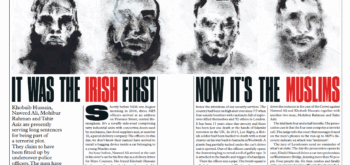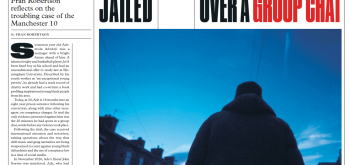Connor Sparrowhawk. His name has got a superhero-like ring to it. ‘Connor Sparrowhawk, the boy who…’ But the boy who what? The boy who ‘loved his family’, suggests mum, Sara Ryan. ‘The boy who loved our dog, Chunky Stan, reading Horrible Histories, watching YouTube films of lorries loading on and off cross-channel ferries, the Mighty Boosh, septic tanks, Eddie Stobart lorries and London busses.’
Connor – ‘Laughing Boy’, as he was known – first caught my attention back in 2014 when a black and white picture of him suddenly filled my Twitter timeline.
LB whose nickname I know and photo I recognise because of his needless, preventable death in July 2013 at a specialist NHS facility, where he drowned following an epileptic seizure whilst bathing unsupervised. You might know about him too, because of what came next: not passive acceptance of his death as that of just another a learning disabled ‘service user’ from ‘natural causes’, but a tireless, dogged campaign by Connor’s family and the support network of #JusticeforLB campaigners.

Connor – and brother Tom
Approximately 1,200 people with learning disabilities die prematurely every year in the UK. Connor, who was 18 years old and had autism and epilepsy, was just one of those. Amid this sea of often-overlooked individuals, what was it about Connor that captured people’s imaginations? When I spoke to his mother she told me that it was ‘a combination of things’, but ‘him being such a character was the key thing’.
‘He had a wistfulness about him that was so appealing,’ Ryan continued. ‘He was great fun, totally quirky and eccentric. He had a comfortableness in his own skin that meant that he was just lovely to hang out with. And I suppose, you end up spending quite a lot of time with kids like Connor, as a mother, because they can’t be left on their own in the same way as other kids.’
The #JusticeforLB campaign drew on the galvanising force that was (and is) Ryan’s blog My Daft Life, which she started in 2011 to document ‘the funny stories that happened in our everyday lives’. For example, the time Connor came home from school and told her ‘I didn’t have a skewer, Mum’ for kebabs in his meal prep class. ‘So what did you eat for lunch?’ ‘Bits, Mum.’
Ryan says that she hadn’t realised at the time the range of people who read her blog: it wasn’t just other parents of learning-disabled children who enjoyed the chance to connect and share their experiences of bringing up children like Connor, whose behaviour sits ‘outside definitions of what is considered ‘normal’’. Increasingly, all manner of other interested parties –medics, teachers, academics, lawyers– were reading it too, a factor which, as time went by, became key.
As Connor got older, the blog’s tone changed. It began to tell of the ‘sadness and low-level fear’ which entered the lives of Ryan and Rich (Connor’s stepdad) after he was diagnosed with epilepsy; of Connor’s sudden change towards uncharacteristic unhappiness and anxiety and Ryan’s experiences of ‘trying and failing to get effective support’, which led to Connor’s admittance to the Slade House site in March 2013, a specialist Short Term Assessment and Treatment Unit run by Southern Health NHS Foundation Trust.
In the wake of Connor’s death, Ryan continued to blog unremittingly about events as they unfurled: the fight to get an ‘Article 2’ inquest (an inquest whereby Article 2 of the European Convention on Human Rights, the right to life, is engaged), and a jury, to examine why and how Connor died; the independent investigation commissioned by Southern Health, which found that Connor’s death was preventable; the Care Quality Commission inspection of Slade House which led to its closure; the prosecution of Southern Health by the Health and Safety Executive for breaching health and safety law in Connor’s case; the referral of Southern Health staff to the General Medical Council and Nursing and Midwifery Council.
The process of bringing to account the public bodies whose neglect contributed to Connor’s death is still on-going more than four years later. So much has happened, it’s hard to know where to start; you could fill a book with it all. Thankfully, Ryan has: Justice for Laughing Boy: Connor Sparrowhawk – A Death by Indifference appeared in bookshops in October 2017, its publication date brought forward (the inside cover still says ‘First published in 2018’). ‘There was so much, I just couldn’t fit everything in,’ Ryan says. ‘There’ll have to be another book.’
 Amongst other things, Laughing Boy & the Slow-Turning Wheels of Justice (just a suggestion) will have to take in the latest round of legal proceedings – the General Medical Council ‘fitness to practice’ tribunal hearing for Dr Murphy, the psychiatrist responsible for Connor’s care at Slade House. The tribunal noted that Dr Murphy failed to apologise for her actions, which included a failure to conduct risk assessments, and failed to show remorse for the consequences.
Amongst other things, Laughing Boy & the Slow-Turning Wheels of Justice (just a suggestion) will have to take in the latest round of legal proceedings – the General Medical Council ‘fitness to practice’ tribunal hearing for Dr Murphy, the psychiatrist responsible for Connor’s care at Slade House. The tribunal noted that Dr Murphy failed to apologise for her actions, which included a failure to conduct risk assessments, and failed to show remorse for the consequences.
Ryan described being cross-examined by Dr Murphy’s barrister as ‘the worse experience I’ve had in my life’ – which, if you have even a passing understanding of what she has been through to get this far, says a great deal. ‘It was one of those smearing exercises. I sat on a chair with the public gallery behind me with a full lever arch file and the barrister would say “can you turn to page 983, paragraph 3”, so I’d get this massive wedge of paper over and he’d say “maybe just look at the meeting there, it doesn’t have your name on it so I’m assuming you didn’t go to that meeting. OK, could you turn to page 2, paragraph 8…” and he just went backwards and forwards; he wasn’t even asking questions, he was just literally saying ‘oh you weren’t there, you didn’t do this, you didn’t do that’. After about an hour I actually had to ask them to stop because I thought I was going to pass out.’
Ryan wound up in A&E that afternoon with severe palpitations brought on by the stress of the ‘grilling’, and she says that the care and treatment she received that day was ‘absolutely wonderful; I couldn’t fault anyone who I saw.’
I wondered how she squared her appreciation of the NHS’s strengths with her sustained criticism of its weaknesses.
‘We’re great fans of the NHS,’ she says, ‘but at the same time, I think that any organisation – particularly those in the public sector – should invite criticism as a means of getting better; they should embrace it. If I’m ever rude about the NHS on Twitter or say something critical, I get a load of abuse: “What are you talking about, you’re going to destroy the NHS”. Don’t be so ridiculous. They should act on the criticism – instead, they deny it and don’t act. I get so fed up of all this ‘fab NHS’ stuff – it’s becoming like something you cannot touch.’
Any number of clichéd phrases spring to mind when I think how best to describe Ryan’s manner – she doesn’t ‘sugar-coat’ things, or ‘pull her punches’; she ‘tells it like it is’. She’s spikey, quick-witted, outspoken, well-spoken, and frank: qualities which have made her such a formidable advocate in the #JusticeforLB fight. She also has the advantage of being articulate and comfortable with social media, not to mention holding a position as an Oxford University academic.
 Did Ryan think that her background gave her an ‘edge’? ‘It didn’t stop the “mother blame” stuff,’ she says. ‘Mother blame’ is a phenomenon referred to in Ryan’s book: ‘Mothers (typically) are expected to care for our children without making a fuss about non-existent or crap services and support. If we dare speak up, on behalf of our children, we’re labelled as ‘hostile’ or ‘toxic’.’
Did Ryan think that her background gave her an ‘edge’? ‘It didn’t stop the “mother blame” stuff,’ she says. ‘Mother blame’ is a phenomenon referred to in Ryan’s book: ‘Mothers (typically) are expected to care for our children without making a fuss about non-existent or crap services and support. If we dare speak up, on behalf of our children, we’re labelled as ‘hostile’ or ‘toxic’.’
‘I was struck by this in the early days,’ Ryan continues; ‘the records presented me as a single mother who was obviously hysterical and deranged and incredibly difficult… I did used to say, well I’ve got a reasonable job, I manage people and so I really can’t understand why you’re saying that I’m this – but they still did it.’
By virtue of the connections Ryan made through writing her blog, she was able to access advice that people aren’t usually given in her situation; for example, Caoilfhionn Gallagher QC from Doughty Street Chambers contacted her via Twitter shortly after Connor’s death to warn her that Connor’s death might not be effectively investigated, and to suggest that she contact INQUEST, a charity which provides free advice to people bereaved by a death in state detention.
Ryan acknowledges that for those families who don’t have resources ‘it must be absolutely horrendous’. ‘While we managed to sort of get accountability, if you didn’t have access to that support and you were dismissed, it must be so distressing,” Ryan says. ‘It was awful to experience anyway on the back of the death of a child, but to experience it whilst being silenced is completely obscene. You are in such a place of pain and distress. I feel chilled to the bone thinking about how many families must be weeping in frustration at not getting any accountability.’
Ryan’s family were dismayed to discover that while Southern Health, as an NHS trust and therefore a state body could spend ‘any amount of public money on their legal representation’, they would be forced to cover their own legal costs themselves. ‘We managed to fundraise that money but I mean – one minute your child’s dead and the next you’re being told somehow you’re going to have to find twenty grand to have legal representation.’
She is an enthusiastic supporter of ‘Hillsborough Law’ which seeks to ensure an ‘equality of arms’ between the state and individuals in inquest proceedings. As for the inquest process itself, she says: ‘It’s totally bizarre, the argument that it’s just inquisitorial. You think, in that case, get rid of any legal representation from the room, just leave the coroner and the families.’
One of her abiding memories of the inquest is of ‘the Southern Health legal team sitting there like it was a football match’. ’They were so gleeful when something visibly went their way. I just couldn’t believe they were openly in it for a fight. Our kids were so upset in the public gallery that our solicitor had to go and speak to [Southern Health] about it.’
Through the bleakness that Connor’s death and it aftermath – including the inquest – brought, #JusticeforLB emerged as a beacon of light. ‘I think we managed to have humour, to find colour and joy and embrace that in a way that was unusual,’ Ryan said, when I asked her what the secret was. She mentioned ‘all the different connections which emerged during the campaign, the diversity of people who came together to support it’ – like the information specialists who popped up after she blogged about the entirely redacted records she received from Southern health in response to her subject access request and told her what she needed to do to get the unredacted version. ‘I think there were just so many instances where people had a particular skills or ability that they shared. I really got the sense that people enjoyed being part of it – that it’s been really important to them.’
A highlight was the ‘107 days of action’ campaign – one for every day Connor spent in the unit, which took place in 2014 to coincide with the first anniversary of his admission. Ryan and ‘Team LB’ asked people to adopt one of each of the 107 days to raise awareness and help fundraise for the costs of legal representation at the upcoming inquest. ‘I’m in awe. It’s just extraordinary what people did’.
Towards the end of my interview, I ask Ryan what ‘justice’ for LB really looks like. In the book, she recalled her son as being ‘a strong defender of human rights, fairness and quality’. ‘He’d rant and rage and call on his legal team to issue injunctions. This was often around being told to empty the dishwasher… . He’d crash the plates and shout about the ways in which his human rights were being breached, even calling it slavery. Our plates remain chipped. And Connor would have expected a strong, human-rights-based campaign around what happened to him.’ Last month, #JusticeforLB was mentioned in the House of Commons. Barbara Keeley, MP for Worsley and Eccles South, named checked it in a debate on safeguarding adults with learning disabilities.
Connor’s name appears in Hansard 26 times.
I have a young cousin who has learning disabilities and epilepsy just like Connor. She’s nearly finished at college and the question of ‘what next’ is becoming pressing. ‘We’ve done all this campaigning and achieved so much, but at the end of the day, your cousin still hasn’t got a life to look forward to,’ Ryan says. ‘Ideally I would like your cousin to have several options for the next part of her life. This packaging people off into a certain space without any aspiration, any imagination is obscene. Society is impoverished if we’re not actually valuing the contributions of learning disabled people or recognising them. We’re all worse off for it’.
This article first appeared on November 30, 2017






A detailed critique of the Court of Appeal judgment in the case of Oliver Campbell